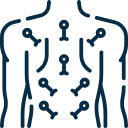Holistic Mental Health Treatment
What Is Holistic Therapy?
URP Behavioral Health is a residential facility that treats mental health conditions ranging from anxiety and depressive disorders to schizophrenia and dissociative disorders. While each resident receives an individualized treatment plan depending on their mental health condition, the integration of holistic therapies is crucial. The experts at URP Behavioral Health believe in treating mental health conditions using a combination of evidence-based and holistic medicine. Let’s discuss what it is, what it includes, and how it’s beneficial.
This form of therapy looks at the whole person instead of just their mental health problems. It’s based on the idea that, mental, spiritual, and physical health are all interconnected. Therefore, it includes elements that work on your overall well-being, such as nutrition, exercise, and meditation, as part of mental health recovery.

Benefits of a Holistic Approach to Mental Health
Some of the benefits of adopting a holistic approach towards mental health involve the following:
Reduce Stress and Anxiety
The most effective aspect of the holistic approach is that it can alleviate stress and anxiety. Techniques such as yoga, mindfulness, and therapeutic massage lower cortisol and adrenaline levels so you experience fewer anxious thoughts.
Learn New Coping Skills
You may discover that unhelpful emotions like shame, hopelessness, guilt, and anger worsen the symptoms of your mental health disorder. Through holistic therapies, you can build coping strategies that help you manage such negative thoughts.
Instills a Sense of Spirituality
Through activities like equine therapy and mindfulness meditation, you feel a sense of meaning, purpose, and hope. You start to build a deeper connection with something greater than yourself, allowing you to practice self-control, self-esteem, and confidence.
Increases Self-Awareness
Through holistic therapy, you’ll reflect on your relationships, feelings, and many other aspects of your life. Going through this process encourages you to understand yourself and the connections between them. Consequently, you’ll start to determine which areas of your life lead to distress and unhappiness.
FAQs for Holistic Treatment for Mental Health Disorders
These are some of the most commonly asked questions about using holistic treatment for mental illness.
The benefit of holistic treatment is that it acknowledges the effect of the mind, body, and spirit on each other. By using this approach, the therapist views the condition from multiple perspectives rather than just one. This increases the chances of positive outcomes.
At URP Behavioral Health, all individualized treatment plans are developed according to a holistic approach. The availability of relaxation treatments, complementary therapies, and nutrition counseling can indicate the use of a holistic approach. In contrast, emphasis on pharmacotherapy and a single therapeutic approach to alleviate symptoms is a more conventional mode of mental health treatment.
Let Us Guide You Towards Healing
We know that seeking treatment can be overwhelming, but our staff is here to make the process as smooth as possible. We’re available 24/7 to address any questions or concerns you may have.









